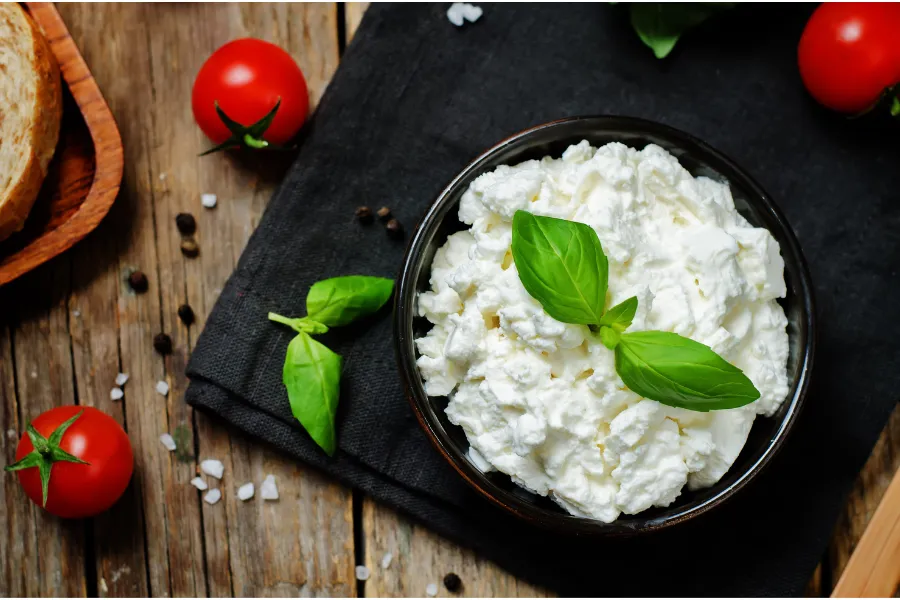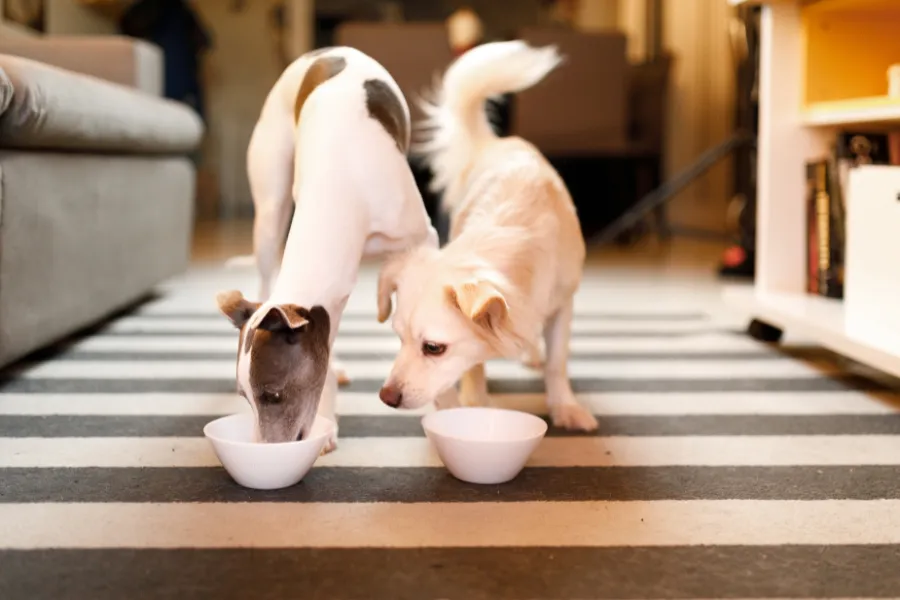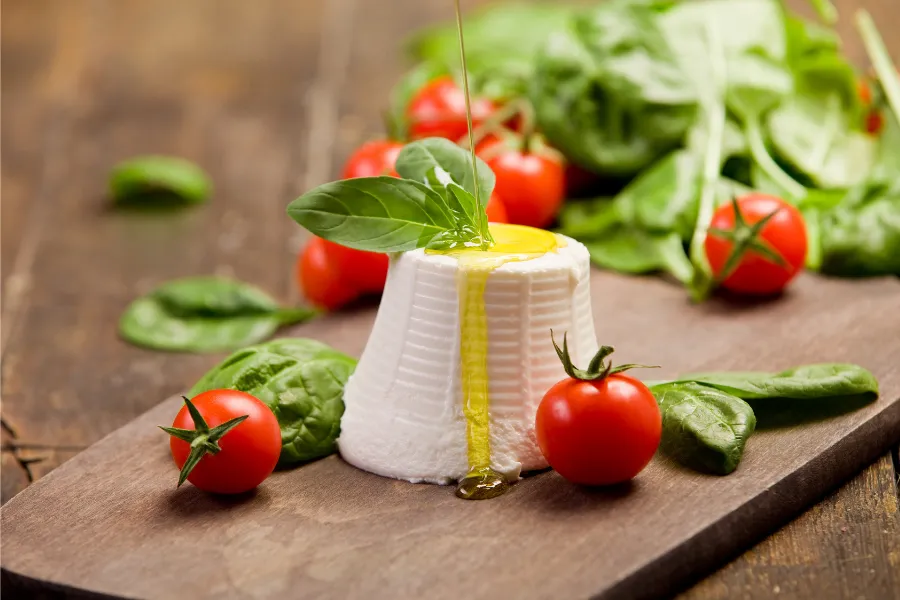Dogs love cheese! Can Dogs Eat Ricotta Cheese? Is ricotta cheese safe to give your pup? We’re here to help you find the answer and provide tips on how much you can give your puppy. So stick around and get the scoop on whether or not ricotta cheese is a safe treat for Fido!
Info About Ricotta Cheese
It is an Italian-style cheese made from cow’s milk whey. It is a soft, creamy, and sweet-tasting cheese made with milk curds that are heated and then strained. The texture of ricotta cheese varies depending on the milk used.
Ricotta cheese contains very low levels of lactose (a type of sugar), making it easier for some people to digest than other dairy products. The calcium content of ricotta cheese is high compared to different cheeses, making it a good source of nutrition for your dog.
It also contains both high-quality proteins and fats, which can help dogs gain weight if they need it. Lastly, ricotta cheese includes vitamins A, B12, C, E, and K1 and phosphorus, magnesium, and zinc. These are essential nutrients that dogs require in their diet.
However, like all other dairy products, regular consumption of ricotta cheese can lead to digestive problems in dogs. Only offer it in small quantities as an occasional treat, or mix a small amount into your dog’s regular diet!

Is ricotta cheese safe for dogs to consume?
Dog owners are often curious whether it is safe for their dogs to eat ricotta cheese. The reality is that in moderate amounts, ricotta cheese can be a healthy snack for your dog. Ricotta cheese contains a significant amount of fat and calories, but also it is rich in essential vitamins and minerals such as protein, calcium, and vitamin A.
Before you give your pup a taste of ricotta, there are some essential things to consider. Dogs may be sensitive to dairy products, so ricotta cheese should only be given in small amounts. Giving too much at once could result in an upset stomach or diarrhea. To reduce the risk of these side effects, ensure the cheese is thoroughly cooked or pureed before giving it to your pup.
Additionally, ricotta cheese can also help keep your pup’s hunger at bay when snacks are scarce. For fresh starters, try leaning towards low-fat varieties, as they will have fewer calories than traditional ones. When feeding dogs any dairy food like ricotta cheese, ensure the serving size is at most 10% of their daily caloric intake.
While it isn’t necessary for healthy dogs to have ricotta in their diet, small portions as an occasional treat won’t cause problems.
Can ricotta cheese be a part of a healthy diet for dogs?
Ricotta cheese is a popular and versatile ingredient in many Italian dishes and a great source of calcium for humans. But can it be fed to dogs? The answer depends on your dog’s health and the type of ricotta you are offering.
The most straightforward answer is that in moderation, ricotta cheese can form a part of a healthy diet for dogs. Ricotta cheese can be an occasional treat or used as an ingredient in their meals for added flavor. Ricotta cheese contains complex protein, energy-rich fats, vitamins, polar lipids, and minerals that benefit your pet’s health if fed in small amounts.
However, when feeding any food to your pet, it is essential to remember that no single food should make up most of their diet. Moderation is vital with any dietary addition, even those as seemingly harmless as ricotta cheese. The best approach is to discuss potential changes with your veterinarian before incorporating these changes into your pet’s meals.
It’s relatively low in lactose compared to other dairy products – making it more digestible. However, it may still cause issues when introduced too quickly or frequently, depending on individual allergies or sensitivities. Talk to your vet if your dog cannot tolerate ricotta cheese.

Are there any potential health risks for dogs who eat ricotta cheese?
Ricotta cheese is a soft, creamy cheese made from whey, the liquid that remains after the curds are separated from the milk during the cheese-making process. Ricotta can be a good source of calcium, phosphorus, and selenium for humans. Dogs can eat ricotta cheese as long as it contains no added flavors or spices that may be hazardous. However, some potential health risks exist for dogs who eat ricotta cheese.
What you need to know about feeding ricotta cheese to your pet:
- Regarding fat content, ricotta is one of the higher-fat cheeses available. While this isn’t necessarily bad for dogs, too much fat can cause an upset stomach or weight gain in some pets. It also contains lactose which may induce digestive issues if consumed in large amounts by a lactose-intolerant animal. As with all other cheeses, overindulgence (especially by small breeds like those under 25 pounds) could lead to pancreatitis. That’s why giving small servings of just a few tablespoons is essential.
- Sodium content is another thing you’ll have to keep an eye on. Some varieties contain a lot of sodium which is detrimental if consumed in excess, especially when combined with other foods such as salami slices or meats. If possible, buy low-sodium brands of Ricottas and regularly track your pet’s calorie intake. That way, your pup will stay healthy and fit – even when snacking on delicious cheesy treats like ricotta!
How much ricotta cheese can a dog safely eat?
It’s no secret that humans love food, and some of us enjoy sharing snacks with our canine friends. Not all human foods, including ricotta cheese, are safe for dogs.
So, is ricotta cheese safe for your dog? The short answer is yes, but only in moderate amounts and with caution. Ricotta cheese contains lactose in varying quantities depending on the brand. So, if your dog has a dairy intolerance, consuming even small amounts of ricotta can make them sick. Additionally, the salt content in ricotta cheese can cause an upset stomach in an otherwise healthy pup if eaten in large amounts.
When considering ricotta cheese as a treat, you should limit it to a small spoonful (1/4 teaspoon or so) once or twice a week. You can mix the ricotta cheese into your pup’s regular food or serve it separately, but moderation is key.
Rich cheeses like blue cheese, feta, and cottage cheese should also be avoided. They contain higher sodium levels than regular cheddar, brie cheese, and Swiss cheese, which are safer for dogs to consume. Remember that feeding your dog high-fat food, such as ricotta, can contribute to weight gain, which may lead to ailments like diabetes and joint pain.
Finally, always watch your pup closely for signs of adverse reactions such as vomiting or diarrhea before feeding them any more significant portions again.

Are there any specific breeds of dogs that should avoid ricotta cheese?
Generally, ricotta cheese is safe to offer your dog in small quantities as a high-protein treat. But, like with any food, certain safety risks or dietary restrictions may apply to specific breeds of dogs.
Some dogs may have allergies to certain types of dairy, making ricotta cheese an unsuitable treat. Dogs suffering from pancreatitis should also stay away from ricotta cheese because it can worsen the signs and symptoms of this condition.
Regarding specific breeds:
- Smaller dogs are more prone to digestive issues than larger breeds and should avoid eating large amounts of ricotta cheese due to its high fat content.
- Some brachycephalic dog breeds (such as pugs and bulldogs) might experience breathing difficulties if they consume large amounts of cheese since this snack can trigger acid reflux.
- Senior dogs—usually tend to have weaker digestive systems. They should also limit their intake of ricotta cheese as much as possible to prevent stomach upsets.
Overall, offering a small amount of ricotta cheese is unlikely to cause any health problems. However, always look out for adverse reactions after handing out such treats.
If you suspect your dog has an allergy or intolerance towards ricotta cheese, contact your trusted veterinarian immediately.
Are there any signs of an allergic reaction to ricotta cheese in dogs?
When considering whether to add ricotta cheese to your dog’s diet, it’s important to consider the potential for an allergic reaction. It is not uncommon for dogs to experience an allergic reaction when exposed to a food or substance they haven’t had before.
It would help if you slowly introduced ricotta cheese into your dog’s diet. Depending on the severity of the allergies, you may observe anything from minor skin reactions such as dry patches and itching. Also, more serious reactions manifest as digestive issues, such as vomiting, nausea, and diarrhea.
An allergy test can determine if your dog is allergic to any ingredient in ricotta cheese. It helps establish a baseline before introducing a portion of food into their diet. There are other symptoms you should watch out for that may indicate an allergic reaction in dogs.
These include:
- Increased scratching at the skin or hives
- Sudden chewing motions
- Redness around the eyes, lips, or mouth
- Swollen paws or face
- Vomiting or diarrhea
- Difficulty breathing or wheezing
- It decreased energy levels
Suppose your pet displays any of these symptoms after eating ricotta cheese. In that case, it is essential to take them immediately to see a veterinarian so that they can receive proper care and treatment. It is necessary to keep track of all ingredients to identify allergens in case of a reaction.

Conclusion
In conclusion, ricotta cheese should be a safe treat to offer your canine companion in moderation. Ricotta cheese is a soft, creamy cheese that contains essential nutrients that may benefit a dog’s health. It is low in fat, making it a great fresh treat for dogs with sensitive stomachs.
However, due to its high lactose levels, you should observe your canine when feeding them ricotta cheese. If your dog is sensitive to lactose, avoid feeding them ricotta cheese. Additionally, as with all treats, only feed them in moderation so they don’t consume too many calories that can lead to weight gain or other digestive issues. Consider the size of your puppy before providing any cheesy goodness!
